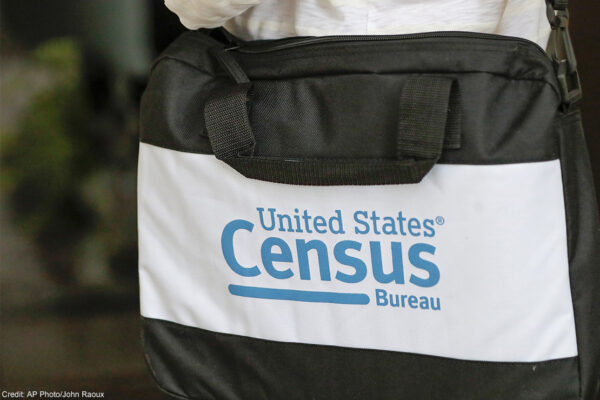At Liberty Podcast

At Liberty Podcast
Supreme Court Term in Review: Reconciling Our Losses and Wins
July 6, 2023
Another Supreme Court term has come to a close. This year, the court delivered major decisions on voting rights, free speech, Indigenous sovereignty, and racial justice, among other issues. The ACLU was involved in cases throughout the term and in many ways, our wins exceeded our expectations. However, in the last two days of the term, the court dropped decisions overturning affirmative action, codifying discrimination in the name of “free speech,” and blocking President Biden’s student loan forgiveness plan.
Here to help us reconcile our wins and losses and break down the term is returning favorite, David Cole, ACLU’s national legal director.
In this episode
Kendall Ciesemier
Former Host of At Liberty and Senior Executive Producer of Multimedia

This Episode Covers the Following Issues
-
Voting Rights
-
LGBTQ Rights
-
Discrimination
-
Religion-Based Discrimination Against LGBTQ People
-
LGBTQ Nondiscrimination Protections
-
Free Speech
-
Race and Inequality in Education
-
Diversity and Inclusion in Higher Education
-
Indian Child Welfare Act
-
Indigenous Justice
-
The Voting Rights Act
-
Gerrymandering
-
Religion and Public Schools
-
Cruel, Inhuman, and Degrading Conditions
-
Prisoners' Rights
-
Using Religion to Discriminate
-
Religious Liberty
-
Racial Justice
Related Content
-
GeorgiaFeb 2026

Voting Rights
Pitts V. United States (amicus). Explore Case.Pitts v. United States (Amicus)
The FBI raided Fulton County, Georgia, seizing ballots and other records from the 2020 election. This unprecedented seizure is a continuation of yearslong efforts to challenge Georgia's 2020 election results, now aided by federal law enforcement. Fulton County is fighting back, suing for the return of the records.Status: Ongoing -
Press ReleaseFeb 2026

Voting Rights
Aclu Condemns House Passage Of Save America Act As Dangerous Assault On Democracy. Explore Press Release.ACLU Condemns House Passage of SAVE America Act as Dangerous Assault on Democracy
WASHINGTON — The U.S. House of Representatives has passed the so-called SAVE America Act, which would impose new burdensome requirements related to voter registration processes and expand federal involvement in state election administration. The bill now moves to the U.S. Senate for consideration. “The SAVE America Act is another thinly veiled attempt to interfere with our elections,” said Xavier Persad, senior policy counsel for ACLU’s National Political Advocacy Department. “There is no evidence of widespread voter fraud that justifies imposing burdensome show-your-papers requirements on every eligible voter. Laws like this have historically resulted in many eligible citizens being delayed or denied access to the ballot due to paperwork issues, database mismatches, or bureaucratic error. What we are seeing from elected officials: seizing sensitive voter data, calls to ‘nationalize’ voting, using violent federal agent presence as a bargaining chip — none of this is normal and we must protect our voices and our ability to hold these officials accountable. These attacks on the freedom to vote and local election administration are occurring while federal immigration agents continue to brutalize our communities, kidnap our neighbors, and violate constitutional protections that are foundational to our democracy, including the right to protest and freedom of the press. The SAVE America Act and similar efforts are attempts to distract from these federal abuses of power while silencing voters who seek to hold this administration accountable at the ballot box. We urge the Senate to reject this bill and all attempts to undermine our elections.” The SAVE America Act, like the Make Elections Great Again (MEGA) Act, is another more extreme attempt to enact the dangerous provisions of the SAVE Act. This legislation would require passports or birth certificates just to register to vote or update voter registration information — documents that an estimated 21 million eligible voters don’t have ready access to. As many as 69 million women who have changed their name due to marriage would face additional hurdles. The SAVE America Act would also impose extremely restrictive photo ID requirements to vote. Voters with low incomes, naturalized citizens, voters of color, rural voters, older voters, young voters, and transgender voters would be disproportionately impacted by these restrictions due to financial constraints, mismatched paperwork, and other obstacles. Moreover, the SAVE America Act would force states to engage in faulty voter roll purges and turn over Americans’ private, sensitive voter data to the U.S. Department of Homeland Security. Previously, Kansas enacted a documentary proof-of-citizenship law which required people to prove their citizenship to register to vote. It blocked more than 30,000 eligible voters from registering to vote, and was later struck down for violating the National Voter Registration Act and U.S. Constitution. The vote comes amid ongoing legal disputes between the federal government and several states concerning access to voter records and election data. In recent months, the Trump Administration has sought expanded access to sensitive voter information, without explanation or plans to protect it, and has raided an election center in Fulton County, Georgia in an attempt to further push false claims about the 2020 election results. -
Press ReleaseFeb 2026

Voting Rights
Civil Rights Groups Defend Constitutional Census In Missouri Challenge. Explore Press Release.Civil Rights Groups Defend Constitutional Census in Missouri Challenge
ST. LOUIS — A group of civil rights organizations filed a motion to intervene as defendants in State of Missouri v. U.S. Department of Commerce, a lawsuit seeking to overturn the Census Bureau’s long-standing and constitutionally required policy of counting all persons residing in the United States for apportionment purposes, including undocumented immigrants and people living in the country on temporary visas. Missouri’s challenge asks the court to upend centuries of constitutional practice by excluding millions of residents from the decennial census, including redoing how many congressional seats each state currently has five years and now in a third election cycle after the fact. All of this would unfairly distort political representation and deprive communities of critical federal resources both now and in the future. Proposed Intervenors OCA-Asian Pacific American Advocates, Make the Road New York, the New York Immigration Coalition, and FIEL Houston, Inc., represented by the American Civil Liberties Union, ACLU of Missouri, ACLU of Texas, ACLU of Northern California, ACLU of Southern California, New York Civil Liberties Union, and Asian Americans Advancing Justice-AAJC, seek to defend the constitutional requirement that the decennial census count all persons residing in the United States. Failure to do so would result in a severe undercount, which affects congressional representation and Electoral College votes, thereby reducing political power for underrepresented communities. Census data also determines the allocation of more than $2.8 trillion in federal funding, which goes towards healthcare, education, social services, infrastructure, and more. The filers released the following joint statement: “We are intervening in this case to defend a bedrock constitutional principle: everyone counts. Missouri’s attempt to exclude undocumented people and individuals living in the United States on temporary visas is nothing more than an effort to manipulate the census for political gain — at the expense of democracy. The decennial census must count the ‘whole number of persons’ residing in each state — not just citizens, and not only those favored by state officials. Past attempts to rig the census at the expense of immigrants and communities of color have been struck down, and the court should do the same here. We will not allow states to erase millions of people from the count simply because of who they are or where they come from.” For more than two centuries, the census has counted all residents, regardless of citizenship or immigration status. The intervenors urge the court to reject Missouri’s attempt to rewrite the Constitution and to uphold the Census Bureau’s policy. Read the motion to intervene here: https://www.aclu.org/cases/missouri-v-u-s-department-of-commerce?document=Memorandum-in-Support-of-Motion-to-Intervene-as-Defendants-by-OCA-Asian-Pacific-American-Advocates-Make-the-Road-New-York-New-York-Immigration-Coalition-and-FIEL-Houston-IncCourt Case: Missouri v. U.S. Department of CommerceAffiliates: Missouri, Northern California, Southern California, Texas, New York -
MissouriFeb 2026

Voting Rights
Missouri V. U.s. Department Of Commerce. Explore Case.Missouri v. U.S. Department of Commerce
A coalition of civil rights and immigrant-rights organizations has moved to intervene as defendants in a lawsuit that threatens to dismantle the Constitution’s long-standing requirement that the decennial census count all people living in the United States. Missouri asks the court to exclude undocumented immigrants and people living in the country on temporary visas from the census count used to determine congressional representation—an unprecedented move that would upend more than two centuries of constitutional practice.Status: Ongoing
